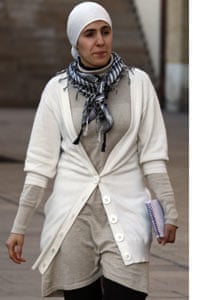
Olivier Besancenot, the postman-turned-revolutionary at the helm of France's anti-capitalist movement, has been fiercely criticised from all sides of the political spectrum for fielding a headscarf-wearing candidate in forthcoming elections.
Ilham Moussaid, a 21-year-old Muslim woman who describes herself as "feminist, secular and veiled", is running for the far-left New Anti-Capitalist party (NPA) in the south-eastern region of Avignon.
But, despite her insistence that there is no contradiction between her clothing and her political role, Moussaid's candidacy in the regional vote due in March has angered other feminists and politicians.
In an echo of the controversy raised by recent moves to ban the full, face-covering veil in public places such as schools, hospitals and buses, critics have said that the young activist's headscarf, which conceals only her hair, goes against values of laïcité – secularism – and women's rights.
Today, in a sign of how deep concerns are running, a leading feminist group announced it would file an official complaint against the NPA's list of candidates in the Vaucluse département to protest against what it called an "anti-secular, anti-feminist and anti-republican" stunt.
"In choosing to endorse 'open' laïcité, the NPA is perverting the values of the Republic and suggesting we reread them in a manner which conforms with regressive visions of women," said the Ni Putes Ni Soumises (Neither Whores Nor Submissives) association in a statement.
Others have expressed their shock at Besancenot's attempt to field a candidate who sees no problem with making an overt statement about her religion in the public sphere, a practice considered taboo.
Moussaid's candidacy has been considered all the more surprising because she is running for a party with far-left leanings traditionally seen as hostile to religion and pro-women's rights. Socialist MP Aurélie Filippetti advised Besancenot to "reread Marx" in order to understand why the headscarf was unacceptable.
The government is attempting to wrap up a "great debate" on national identity, which many people believe has caused Islamophobia. It is reminiscent of the controversy in 2004 when headscarves and other conspicuous religious symbols were banned from state schools.
Moussaid, an advocate of contraception and abortion rights whose candidacy was announced last month, said she had been particularly stung by the criticism from feminist groups. "Try as I might to explain that I am not oppressed and that it shows, there's still a lack of understanding," she told today's Le Monde.
In a statement to local party members at the weekend she wrote: "It is with great sadness that I watch … my life reduced to my headscarf. It is with great sadness that I hear that my personal beliefs are a danger to others while I advocate friendship, respect, tolerance, solidarity and equality for all human beings."
Comments (…)
Sign in or create your Guardian account to join the discussion